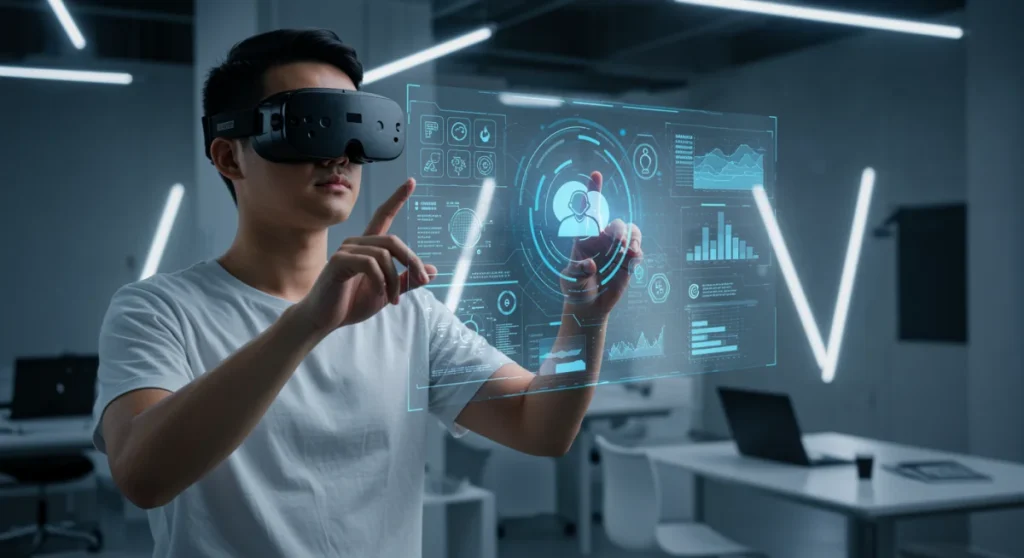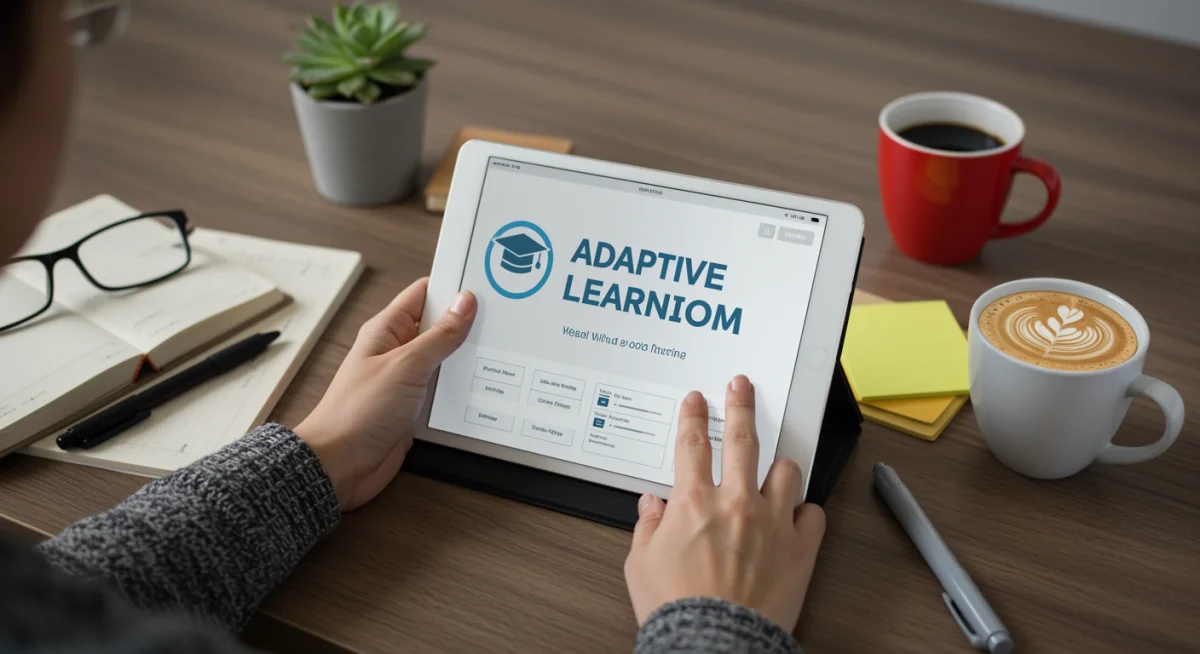Personalized Learning: 6 Smart Hacks for Quicker Skill Absorption

Personalized learning hacks are essential for accelerating skill acquisition, enabling individuals to absorb new knowledge and competencies 1.5 times quicker by leveraging tailored strategies and cutting-edge approaches in 2025.
In an increasingly dynamic world, the ability to rapidly acquire and master new skills is not just an advantage, but a necessity. This article delves into how personalized learning hacks can revolutionize your educational journey, allowing you to absorb new skills 1.5 times quicker in 2025.
Understanding the Power of Personalized Learning
Personalized learning is not a new concept, but its evolution in recent years has been nothing short of transformative. It moves beyond the one-size-fits-all educational model, recognizing that each individual possesses unique learning styles, paces, and preferences. By tailoring the learning experience to these individual needs, we can unlock unprecedented levels of efficiency and comprehension.
This approach leverages data, technology, and pedagogical insights to create a customized pathway for every learner. Instead of passively receiving information, learners become active participants in a process designed specifically for them. This creates a more engaging and effective environment, directly addressing the common frustrations associated with traditional learning methods.
The Shift from Traditional to Tailored Education
Historically, education has largely been a standardized affair. Classrooms and curricula were designed to cater to a perceived average student, often leaving those who deviated from this norm either bored or struggling. The advent of digital tools and advanced analytics has shattered this paradigm, making truly personalized education a tangible reality.
- Adaptive Content Delivery: Learning platforms now adjust the difficulty and type of content based on real-time performance.
- Individualized Feedback: Learners receive specific, actionable feedback that helps them understand their strengths and areas for improvement.
- Flexible Pacing: Students can progress at their own speed, ensuring mastery before moving on, or accelerating through familiar material.
- Diverse Learning Resources: Access to a wide array of multimedia, interactive exercises, and expert-led modules caters to different preferences.
The core principle here is optimization: optimizing the learning journey for maximum retention and skill transfer. When content is relevant, challenging but not overwhelming, and delivered in a preferred format, the brain is far more receptive to absorbing new information quickly and efficiently.
In essence, personalized learning is about making education work for the individual, rather than forcing the individual to conform to a rigid educational system. This fundamental shift is what empowers the hacks we’ll explore, enabling a significantly faster absorption of new skills.
Hack 1: Leveraging AI-Powered Adaptive Learning Platforms
Artificial Intelligence has emerged as a cornerstone of modern personalized learning. AI-powered adaptive learning platforms are sophisticated tools that analyze your learning patterns, strengths, and weaknesses to create a dynamic and highly effective curriculum. They go beyond simple quizzes, understanding the ‘why’ behind your responses.
These platforms continuously gather data on your performance, engagement, and even emotional responses to learning material. This data then informs algorithms that adjust the content, sequence, and instructional methods in real-time. The goal is to keep you in the optimal zone of learning – challenging enough to promote growth, but not so difficult as to cause frustration.
How AI Transforms Your Learning Path
Imagine a tutor who knows precisely which concepts you’ve mastered, which ones you’re struggling with, and the most effective way to present new information to you. That’s essentially what an AI-powered platform offers. It customizes every aspect of your learning journey, from the types of exercises you receive to the examples used to illustrate complex ideas.
- Dynamic Curriculum Adjustment: Content adapts based on your progress, ensuring you focus on areas needing improvement.
- Predictive Analytics: AI can predict potential learning difficulties and proactively offer support or alternative explanations.
- Personalized Resource Curation: The platform recommends articles, videos, and other resources specifically tailored to your learning style and current needs.
- Intelligent Feedback Loops: Beyond right or wrong, AI provides insights into misconceptions and guides you towards correct understanding.
By constantly refining the learning path, these platforms minimize wasted effort on already understood topics and maximize time spent on challenging areas. This targeted approach is a significant factor in accelerating skill acquisition, making the learning process more streamlined and less frustrating. It’s like having a dedicated learning coach available 24/7, always optimizing for your success.
Hack 2: Implementing Microlearning for Focused Skill Development
Microlearning involves breaking down complex topics into small, digestible chunks that can be consumed quickly and efficiently. In our fast-paced world, attention spans are often fragmented, making traditional long-form learning challenging. Microlearning addresses this by delivering information in short bursts, perfectly suited for busy schedules and diverse learning environments.
This approach isn’t just about brevity; it’s about intentional design. Each micro-lesson is focused on a single learning objective, ensuring clarity and preventing cognitive overload. The content can take various forms, from short videos and interactive quizzes to infographics and quick articles, all designed for maximum impact in minimal time.
The Benefits of Bite-Sized Knowledge
The power of microlearning lies in its ability to integrate seamlessly into daily life. Instead of dedicating large blocks of time, you can learn during commutes, coffee breaks, or even while waiting in line. This flexibility fosters consistency, which is crucial for long-term skill development and retention.
- Increased Retention: Smaller chunks of information are easier to process and store in long-term memory.
- Higher Engagement: Short, focused lessons prevent boredom and maintain learner interest.
- Immediate Application: Learners can apply newly acquired knowledge almost immediately, reinforcing understanding.
- Reduced Cognitive Load: By focusing on one concept at a time, the brain is less overwhelmed, leading to better comprehension.
Microlearning also aligns well with the personalized learning philosophy. Platforms can deliver micro-lessons tailored to your specific needs and progress, ensuring that each bite-sized piece of information is relevant and timely. This targeted delivery, combined with the inherent efficiency of microlearning, significantly speeds up the absorption of new skills by making learning a continuous, manageable, and highly effective process.
Hack 3: Harnessing Spaced Repetition Systems (SRS)
Spaced Repetition Systems (SRS) are powerful memory aids designed to optimize the timing of review sessions for learned material. Instead of rote memorization, SRS leverages algorithms to present information just as you’re about to forget it, thereby strengthening memory recall and enhancing long-term retention. This method is scientifically proven to be far more effective than traditional cramming or arbitrary review schedules.
The core idea behind SRS is to space out repetitions of learning material at increasing intervals. If you answer a question correctly, the system will show it to you again after a longer period. If you answer incorrectly, it will reappear sooner. This intelligent scheduling ensures that you spend your review time most efficiently, focusing on the information you are most likely to forget, rather than repeatedly reviewing already mastered concepts.
Optimizing Memory for Faster Skill Absorption
Integrating an SRS into your learning routine can dramatically improve your ability to retain complex information and master new skills. Tools like Anki or SuperMemo are popular examples of how this principle is applied, allowing users to create flashcards and then managing their review schedule automatically.

The effectiveness of SRS comes from its alignment with how human memory works. Our brains are not designed to remember everything equally. By strategically challenging our recall at optimal moments, SRS helps to solidify memories, making them more accessible when needed. This is particularly beneficial for skills that require a strong foundational knowledge base.
- Enhanced Long-Term Retention: Information is moved from short-term to long-term memory more efficiently.
- Reduced Study Time: Focuses review on challenging items, saving time on already known material.
- Improved Recall Accuracy: Strengthens neural pathways associated with specific pieces of information.
- Personalized Review Schedule: The system adapts to your individual forgetting curve.
By consistently applying SRS, learners can build a robust knowledge base that supports rapid skill development. It ensures that the effort put into initial learning is not wasted, leading to quicker mastery and application of new competencies.
Hack 4: Implementing Project-Based Learning and Real-World Application
Project-based learning (PBL) shifts the focus from theoretical knowledge to practical application. Instead of just reading about a concept, learners engage in extended, real-world projects that require them to apply their skills to solve authentic problems. This immersive approach fosters deeper understanding, critical thinking, and problem-solving abilities, all crucial for rapid skill absorption.
When you tackle a real project, you encounter challenges that textbook examples often don’t present. This forces you to think creatively, research solutions, collaborate, and adapt your approach – skills that are invaluable for true mastery. The experiential nature of PBL means that learning becomes less abstract and more tangible, directly connecting knowledge to its practical utility.
Bridging Theory and Practice for Accelerated Mastery
The power of PBL lies in its ability to simulate real-world scenarios. Whether it’s building a website, designing a marketing campaign, or coding a new application, these projects demand the integration of various skills and knowledge domains. This synthesis reinforces learning and accelerates the transition from novice to competent practitioner.
Consider the difference between reading a manual on how to fix a car and actually fixing one. The latter provides hands-on experience, immediate feedback, and a deeper understanding of the mechanics involved. PBL replicates this dynamic across various fields, making learning more engaging and effective.
- Deeper Understanding: Applying concepts in a real context solidifies knowledge far more effectively than passive learning.
- Problem-Solving Skills: Projects present authentic challenges, forcing learners to develop creative solutions.
- Increased Motivation: Working on something tangible and meaningful boosts engagement and intrinsic motivation.
- Skill Integration: PBL encourages the use of multiple skills simultaneously, fostering holistic development.
By consistently engaging in project-based learning, individuals can significantly accelerate their skill acquisition. The process of actively creating, troubleshooting, and delivering a tangible outcome embeds knowledge and skills far more deeply than traditional methods, leading to quicker and more robust mastery.
Hack 5: The Role of Personalized Feedback Loops and Mentorship
Effective feedback is a critical, yet often overlooked, component of rapid skill acquisition. Personalized feedback loops, whether from an AI system, a peer, or a dedicated mentor, provide targeted insights into your performance, highlighting areas of strength and identifying specific opportunities for improvement. This individualized guidance is far more impactful than generic assessments, directly accelerating your learning curve.
Mentorship takes this a step further by offering experienced guidance and support. A mentor can share practical wisdom, help navigate complex challenges, and provide motivation. This human element in personalized learning offers invaluable context and perspective that automated systems, however advanced, cannot fully replicate.
Refining Skills with Targeted Guidance
The quality and specificity of feedback directly correlate with the speed of learning. When you understand precisely where you went wrong and, more importantly, how to correct it, you avoid repeating mistakes and solidify correct practices. This iterative process of action, feedback, and adjustment is fundamental to mastery.
AI-powered tools can provide immediate, granular feedback on tasks like coding or language practice. Human mentors, on the other hand, offer qualitative insights into strategic thinking, communication, and complex problem-solving. A combination of both can create a powerful ecosystem for learning.
- Specific Error Correction: Identifies precise mistakes and offers actionable remedies.
- Performance Enhancement: Highlights effective strategies and encourages their consistent application.
- Motivation and Accountability: Mentors provide encouragement and help maintain focus on learning goals.
- Strategic Guidance: Offers insights into career paths, industry trends, and advanced problem-solving techniques.
By actively seeking and integrating personalized feedback, and by engaging with knowledgeable mentors, learners can significantly shorten the time it takes to absorb and expertly apply new skills. This continuous refinement process ensures that learning is not just about accumulating knowledge, but about perfecting its application.
Hack 6: Cultivating a Growth Mindset and Self-Reflection
While technology and structured methods are crucial, the internal landscape of the learner plays an equally vital role in accelerating skill acquisition. Cultivating a growth mindset – the belief that abilities can be developed through dedication and hard work – fundamentally changes how individuals approach challenges and setbacks. This mindset transforms obstacles into opportunities for learning, fueling a relentless pursuit of improvement.
Self-reflection complements this by encouraging learners to critically evaluate their own progress, identify personal learning preferences, and adjust their strategies accordingly. It’s about becoming your own learning architect, understanding what works best for you and proactively optimizing your approach.
The Internal Engine of Accelerated Learning
A growth mindset reframes failure not as a definitive end, but as valuable data. When faced with difficulty, individuals with a growth mindset are more likely to persist, seek new strategies, and view the struggle as a necessary part of the learning process. This resilience is a powerful catalyst for faster skill absorption.
Self-reflection, on the other hand, is the compass that guides this journey. Regularly asking questions like “What did I learn today?” “How could I have done this better?” or “What resources would help me next?” allows for continuous self-optimization. This meta-cognitive awareness turns every learning experience into a valuable lesson, not just in the subject matter, but in the art of learning itself.
- Increased Resilience: Overcoming challenges becomes a natural part of the learning process.
- Enhanced Problem-Solving: Actively seeking solutions and adapting strategies.
- Greater Motivation: Intrinsic drive to improve and master new skills.
- Personalized Strategy Development: Identifying and refining individual learning techniques.
By nurturing a growth mindset and engaging in consistent self-reflection, learners create an internal environment that is primed for rapid skill acquisition. These internal hacks empower individuals to take ownership of their learning journey, making them more adaptable, persistent, and ultimately, more effective at absorbing new knowledge and capabilities.
| Key Learning Hack | Brief Description |
|---|---|
| AI Adaptive Platforms | AI analyzes learning patterns to customize content and pace for optimal efficiency. |
| Microlearning | Breaks down complex topics into small, digestible chunks for quick and focused consumption. |
| Spaced Repetition | Optimizes review timing to strengthen memory recall and enhance long-term retention. |
| Project-Based Learning | Applies theoretical knowledge to real-world projects for deeper understanding and practical mastery. |
Frequently asked questions about personalized learning
▼
Personalized learning tailors education to individual needs, styles, and paces, moving beyond generic teaching. It’s crucial because it optimizes engagement, retention, and skill acquisition by addressing unique learner profiles, making the learning process significantly more efficient and effective for everyone.
▼
AI platforms analyze your progress and adapt content, difficulty, and methods in real-time. This ensures you focus on areas needing improvement, receive customized feedback, and learn at an optimal pace, thereby accelerating comprehension and retention of new skills by targeting your specific needs.
▼
Yes, by breaking down complex topics into short, focused modules, microlearning prevents cognitive overload and improves retention. Its flexibility allows for consistent learning integration into daily routines, making complex skills more manageable and easier to absorb incrementally, leading to faster overall mastery.
▼
A growth mindset, the belief that abilities can be developed through effort, fosters resilience and persistence. It encourages learners to view challenges as opportunities for growth, leading to greater motivation, adaptability, and a proactive approach to overcoming obstacles, which significantly speeds up skill acquisition.
▼
Begin by identifying your learning style, then explore AI-adaptive platforms or microlearning apps relevant to your desired skills. Incorporate spaced repetition for review and seek out project-based opportunities. Most importantly, cultivate a growth mindset and regularly self-reflect on your progress and methods.
Conclusion
The landscape of learning is rapidly evolving, and the future belongs to those who embrace personalized, efficient methods. By integrating these six smart hacks into your routine – leveraging AI-powered platforms, embracing microlearning, utilizing spaced repetition, engaging in project-based learning, seeking personalized feedback and mentorship, and cultivating a growth mindset – you can significantly accelerate your skill acquisition. These strategies move beyond traditional approaches, offering a tailored, dynamic, and highly effective path to absorbing new knowledge and competencies at an unprecedented pace. Embrace these innovations to not just keep up, but to thrive in the demands of 2025 and beyond.





